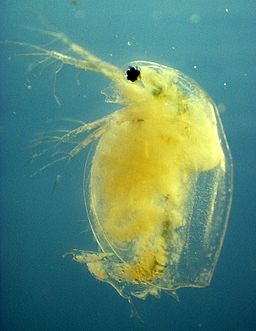Pasteuria ramosa
Pasteuria ramosa
Pasteuria ramosa is a species of bacterium that belongs to the genus Pasteuria. It is known for its parasitic nature, specifically targeting water fleas of the genus Daphnia. This bacterium infects the gut of the water flea, leading to detrimental effects on the host's fitness and reproduction.
Description[edit | edit source]
Pasteuria ramosa is a gram-positive bacterium with a unique lifecycle that involves spore formation. The spores of P. ramosa are highly resistant structures that can persist in the environment for extended periods until they encounter a suitable host, such as a Daphnia water flea.
Host Specificity[edit | edit source]
One of the remarkable features of Pasteuria ramosa is its high host specificity towards Daphnia water fleas. The bacterium has evolved mechanisms to recognize and infect specific species or strains of Daphnia, while avoiding others. This specificity plays a crucial role in the dynamics of host-parasite interactions in freshwater ecosystems.
Infection Process[edit | edit source]
When a Daphnia water flea ingests the spores of Pasteuria ramosa, the bacterium germinates and penetrates the gut wall of the host. Once inside the host, P. ramosa proliferates and forms new spores, which are then released into the environment upon the death of the infected Daphnia. These spores can go on to infect other susceptible individuals, perpetuating the cycle of infection.
Ecological Implications[edit | edit source]
The presence of Pasteuria ramosa in freshwater ecosystems can have significant ecological implications. By influencing the population dynamics of Daphnia water fleas, P. ramosa can impact the structure and functioning of aquatic communities. Additionally, the interactions between P. ramosa and its hosts provide valuable insights into the coevolutionary arms race between parasites and their hosts.
Research Significance[edit | edit source]
Studies on Pasteuria ramosa have contributed to our understanding of host-parasite interactions, evolutionary ecology, and microbial ecology. Researchers have used P. ramosa as a model system to investigate questions related to parasitism, adaptation, and biodiversity in natural populations.
Search WikiMD
Ad.Tired of being Overweight? Try W8MD's physician weight loss program.
Semaglutide (Ozempic / Wegovy and Tirzepatide (Mounjaro / Zepbound) available.
Advertise on WikiMD
|
WikiMD's Wellness Encyclopedia |
| Let Food Be Thy Medicine Medicine Thy Food - Hippocrates |
Translate this page: - East Asian
中文,
日本,
한국어,
South Asian
हिन्दी,
தமிழ்,
తెలుగు,
Urdu,
ಕನ್ನಡ,
Southeast Asian
Indonesian,
Vietnamese,
Thai,
မြန်မာဘာသာ,
বাংলা
European
español,
Deutsch,
français,
Greek,
português do Brasil,
polski,
română,
русский,
Nederlands,
norsk,
svenska,
suomi,
Italian
Middle Eastern & African
عربى,
Turkish,
Persian,
Hebrew,
Afrikaans,
isiZulu,
Kiswahili,
Other
Bulgarian,
Hungarian,
Czech,
Swedish,
മലയാളം,
मराठी,
ਪੰਜਾਬੀ,
ગુજરાતી,
Portuguese,
Ukrainian
Medical Disclaimer: WikiMD is not a substitute for professional medical advice. The information on WikiMD is provided as an information resource only, may be incorrect, outdated or misleading, and is not to be used or relied on for any diagnostic or treatment purposes. Please consult your health care provider before making any healthcare decisions or for guidance about a specific medical condition. WikiMD expressly disclaims responsibility, and shall have no liability, for any damages, loss, injury, or liability whatsoever suffered as a result of your reliance on the information contained in this site. By visiting this site you agree to the foregoing terms and conditions, which may from time to time be changed or supplemented by WikiMD. If you do not agree to the foregoing terms and conditions, you should not enter or use this site. See full disclaimer.
Credits:Most images are courtesy of Wikimedia commons, and templates Wikipedia, licensed under CC BY SA or similar.
Contributors: Prab R. Tumpati, MD

